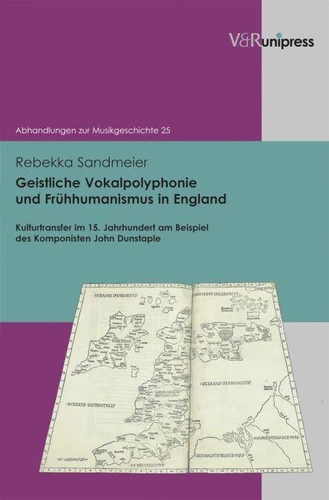Geistliche Vokalpolyphonie und Frühhumanismus in England. Kulturtransfer im 15. Jahrhundert am Beispiel des Komponisten John Dunstaple
Par : , , , ,Formats :
Disponible dans votre compte client Decitre ou Furet du Nord dès validation de votre commande. Le format PDF est :
- Compatible avec une lecture sur My Vivlio (smartphone, tablette, ordinateur)
- Compatible avec une lecture sur liseuses Vivlio
- Pour les liseuses autres que Vivlio, vous devez utiliser le logiciel Adobe Digital Edition. Non compatible avec la lecture sur les liseuses Kindle, Remarkable et Sony
 , qui est-ce ?
, qui est-ce ?Notre partenaire de plateforme de lecture numérique où vous retrouverez l'ensemble de vos ebooks gratuitement
Pour en savoir plus sur nos ebooks, consultez notre aide en ligne ici
- Nombre de pages328
- FormatPDF
- ISBN978-3-86234-946-3
- EAN9783862349463
- Date de parution15/08/2012
- Protection num.pas de protection
- Taille3 Mo
- Infos supplémentairespdf
- ÉditeurV&R Unipress
Résumé
Music of the fifteenth century shows a change in style, the origin of which contemporary historical and theoretical sources place in England. At the same time as English characteristics appear in the music of the new style, the ideas of humanism spead throughout Europe. However, both developments are difficult to grasp in musical terms; broadly speaking they are related to a new perception of music as sound (rather than arithmetic) and to the regional and temporary delimitation of the new style.
The life, work and environment of John Dunstaple lend themselves to explore these developments, as his name is often mentioned in relation to the new style in theoretical writings of the fifteenth century, and in musical sources it is used as a marker for the English origin of a composition.
The life, work and environment of John Dunstaple lend themselves to explore these developments, as his name is often mentioned in relation to the new style in theoretical writings of the fifteenth century, and in musical sources it is used as a marker for the English origin of a composition.
Music of the fifteenth century shows a change in style, the origin of which contemporary historical and theoretical sources place in England. At the same time as English characteristics appear in the music of the new style, the ideas of humanism spead throughout Europe. However, both developments are difficult to grasp in musical terms; broadly speaking they are related to a new perception of music as sound (rather than arithmetic) and to the regional and temporary delimitation of the new style.
The life, work and environment of John Dunstaple lend themselves to explore these developments, as his name is often mentioned in relation to the new style in theoretical writings of the fifteenth century, and in musical sources it is used as a marker for the English origin of a composition.
The life, work and environment of John Dunstaple lend themselves to explore these developments, as his name is often mentioned in relation to the new style in theoretical writings of the fifteenth century, and in musical sources it is used as a marker for the English origin of a composition.




